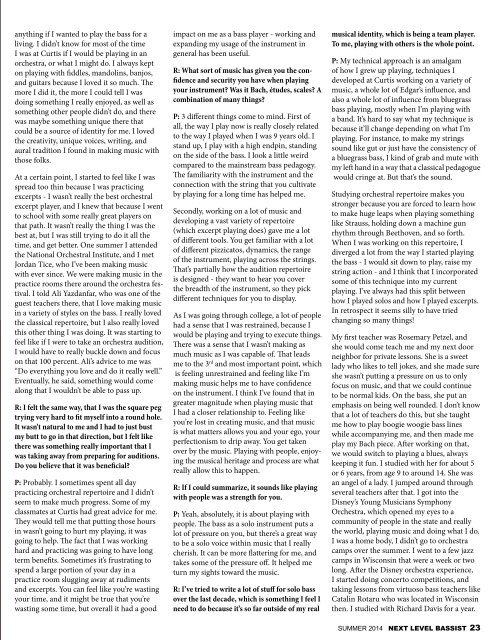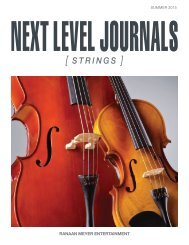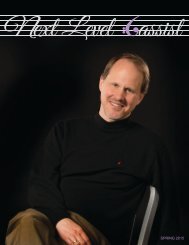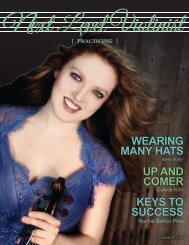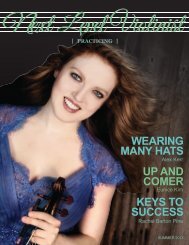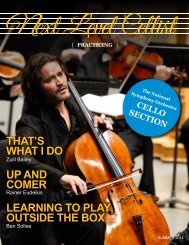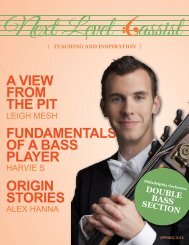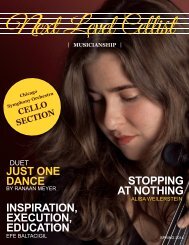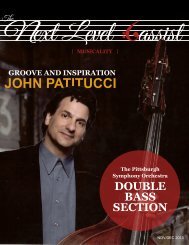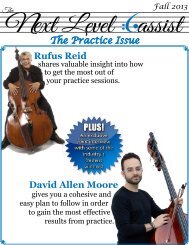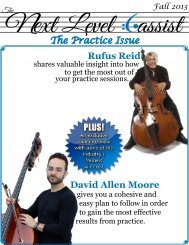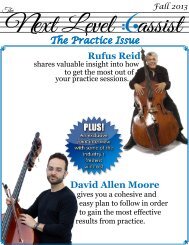Next Level Bassist Left Hand
Summer 2014 edition of Next Level Bassist. Left hand techniques and exercises by Nicholas Walker, Jordan Anderson, Paul Kowert. Section Spotlight on Cleveland Orchestra. Up and Comers Tim Dilenschneider and Jordan Morton
Summer 2014 edition of Next Level Bassist. Left hand techniques and exercises by Nicholas Walker, Jordan Anderson, Paul Kowert. Section Spotlight on Cleveland Orchestra. Up and Comers Tim Dilenschneider and Jordan Morton
Create successful ePaper yourself
Turn your PDF publications into a flip-book with our unique Google optimized e-Paper software.
anything if I wanted to play the bass for a<br />
living. I didn’t know for most of the time<br />
I was at Curtis if I would be playing in an<br />
orchestra, or what I might do. I always kept<br />
on playing with fiddles, mandolins, banjos,<br />
and guitars because I loved it so much. The<br />
more I did it, the more I could tell I was<br />
doing something I really enjoyed, as well as<br />
something other people didn’t do, and there<br />
was maybe something unique there that<br />
could be a source of identity for me. I loved<br />
the creativity, unique voices, writing, and<br />
aural tradition I found in making music with<br />
those folks.<br />
At a certain point, I started to feel like I was<br />
spread too thin because I was practicing<br />
excerpts - I wasn’t really the best orchestral<br />
excerpt player, and I knew that because I went<br />
to school with some really great players on<br />
that path. It wasn’t really the thing I was the<br />
best at, but I was still trying to do it all the<br />
time, and get better. One summer I attended<br />
the National Orchestral Institute, and I met<br />
Jordan Tice, who I’ve been making music<br />
with ever since. We were making music in the<br />
practice rooms there around the orchestra festival.<br />
I told Ali Yazdanfar, who was one of the<br />
guest teachers there, that I love making music<br />
in a variety of styles on the bass. I really loved<br />
the classical repertoire, but I also really loved<br />
this other thing I was doing. It was starting to<br />
feel like if I were to take an orchestra audition,<br />
I would have to really buckle down and focus<br />
on that 100 percent. Ali’s advice to me was<br />
“Do everything you love and do it really well.”<br />
Eventually, he said, something would come<br />
along that I wouldn’t be able to pass up.<br />
R: I felt the same way, that I was the square peg<br />
trying very hard to fit myself into a round hole.<br />
It wasn’t natural to me and I had to just bust<br />
my butt to go in that direction, but I felt like<br />
there was something really important that I<br />
was taking away from preparing for auditions.<br />
Do you believe that it was beneficial?<br />
P: Probably. I sometimes spent all day<br />
practicing orchestral repertoire and I didn’t<br />
seem to make much progress. Some of my<br />
classmates at Curtis had great advice for me.<br />
They would tell me that putting those hours<br />
in wasn’t going to hurt my playing, it was<br />
going to help. The fact that I was working<br />
hard and practicing was going to have long<br />
term benefits. Sometimes it’s frustrating to<br />
spend a large portion of your day in a<br />
practice room slugging away at rudiments<br />
and excerpts. You can feel like you’re wasting<br />
your time, and it might be true that you’re<br />
wasting some time, but overall it had a good<br />
impact on me as a bass player - working and<br />
expanding my usage of the instrument in<br />
general has been useful.<br />
R: What sort of music has given you the confidence<br />
and security you have when playing<br />
your instrument? Was it Bach, études, scales? A<br />
combination of many things?<br />
P: 3 different things come to mind. First of<br />
all, the way I play now is really closely related<br />
to the way I played when I was 9 years old. I<br />
stand up, I play with a high endpin, standing<br />
on the side of the bass. I look a little weird<br />
compared to the mainstream bass pedagogy.<br />
The familiarity with the instrument and the<br />
connection with the string that you cultivate<br />
by playing for a long time has helped me.<br />
Secondly, working on a lot of music and<br />
developing a vast variety of repertoire<br />
(which excerpt playing does) gave me a lot<br />
of different tools. You get familiar with a lot<br />
of different pizzicatos, dynamics, the range<br />
of the instrument, playing across the strings.<br />
That’s partially how the audition repertoire<br />
is designed - they want to hear you cover<br />
the breadth of the instrument, so they pick<br />
different techniques for you to display.<br />
As I was going through college, a lot of people<br />
had a sense that I was restrained, because I<br />
would be playing and trying to execute things.<br />
There was a sense that I wasn’t making as<br />
much music as I was capable of. That leads<br />
me to the 3 rd and most important point, which<br />
is feeling unrestrained and feeling like I’m<br />
making music helps me to have confidence<br />
on the instrument. I think I’ve found that in<br />
greater magnitude when playing music that<br />
I had a closer relationship to. Feeling like<br />
you’re lost in creating music, and that music<br />
is what matters allows you and your ego, your<br />
perfectionism to drip away. You get taken<br />
over by the music. Playing with people, enjoying<br />
the musical heritage and process are what<br />
really allow this to happen.<br />
R: If I could summarize, it sounds like playing<br />
with people was a strength for you.<br />
P: Yeah, absolutely, it is about playing with<br />
people. The bass as a solo instrument puts a<br />
lot of pressure on you, but there’s a great way<br />
to be a solo voice within music that I really<br />
cherish. It can be more flattering for me, and<br />
takes some of the pressure off. It helped me<br />
turn my sights toward the music.<br />
R: I’ve tried to write a lot of stuff for solo bass<br />
over the last decade, which is something I feel I<br />
need to do because it’s so far outside of my real<br />
musical identity, which is being a team player.<br />
To me, playing with others is the whole point.<br />
P: My technical approach is an amalgam<br />
of how I grew up playing, techniques I<br />
developed at Curtis working on a variety of<br />
music, a whole lot of Edgar’s influence, and<br />
also a whole lot of influence from bluegrass<br />
bass playing, mostly when I’m playing with<br />
a band. It’s hard to say what my technique is<br />
because it’ll change depending on what I’m<br />
playing. For instance, to make my strings<br />
sound like gut or just have the consistency of<br />
a bluegrass bass, I kind of grab and mute with<br />
my left hand in a way that a classical pedagogue<br />
would cringe at. But that’s the sound.<br />
Studying orchestral repertoire makes you<br />
stronger because you are forced to learn how<br />
to make huge leaps when playing something<br />
like Strauss, holding down a machine gun<br />
rhythm through Beethoven, and so forth.<br />
When I was working on this repertoire, I<br />
diverged a lot from the way I started playing<br />
the bass - I would sit down to play, raise my<br />
string action - and I think that I incorporated<br />
some of this technique into my current<br />
playing. I’ve always had this split between<br />
how I played solos and how I played excerpts.<br />
In retrospect it seems silly to have tried<br />
changing so many things!<br />
My first teacher was Rosemary Petzel, and<br />
she would come teach me and my next door<br />
neighbor for private lessons. She is a sweet<br />
lady who likes to tell jokes, and she made sure<br />
she wasn’t putting a pressure on us to only<br />
focus on music, and that we could continue<br />
to be normal kids. On the bass, she put an<br />
emphasis on being well rounded. I don’t know<br />
that a lot of teachers do this, but she taught<br />
me how to play boogie woogie bass lines<br />
while accompanying me, and then made me<br />
play my Bach piece. After working on that,<br />
we would switch to playing a blues, always<br />
keeping it fun. I studied with her for about 5<br />
or 6 years, from age 9 to around 14. She was<br />
an angel of a lady. I jumped around through<br />
several teachers after that. I got into the<br />
Disney’s Young Musicians Symphony<br />
Orchestra, which opened my eyes to a<br />
community of people in the state and really<br />
the world, playing music and doing what I do.<br />
I was a home body, I didn’t go to orchestra<br />
camps over the summer. I went to a few jazz<br />
camps in Wisconsin that were a week or two<br />
long. After the Disney orchestra experience,<br />
I started doing concerto competitions, and<br />
taking lessons from virtuoso bass teachers like<br />
Catalin Rotaru who was located in Wisconsin<br />
then. I studied with Richard Davis for a year.<br />
SUMMER 2014 NEXT LEVEL BASSIST 23


